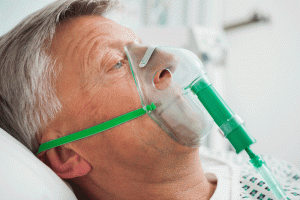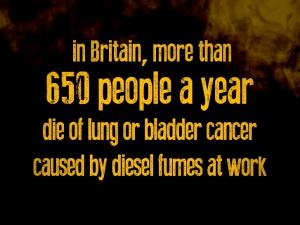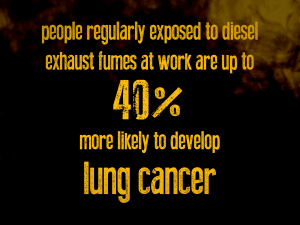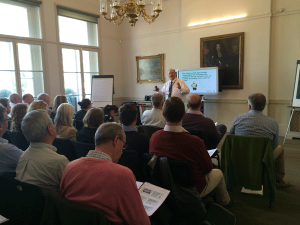Diesel exhaust dangers
I read a headline in yesterday’s Times “Mental cost of diesel fumes like a bereavement.” It has also recently been reported that the Mayor of London, Sadiq Khan is looking to charge drivers of diesel vehicles an extra £10 pollution charge to drive in central London.
These articles are obviously about the pollution from heavy traffic in cities but what about the risks at work?
On construction sites, the second highest threat to the health of workers, after asbestos, is diesel fumes
So, this week I thought it might be timely to look at the hazards associated by the emissions and look at the precautions that employers and individuals can take.
I am going to look at what makes up the Diesel Engine Exhaust Emissions, DEEEs, and the health risks associated with them. Then I will try to provide examples of good working practices as guidance for employers and employees to try and reduce the risk in your workplace.
This week’s 2 recent HSE case look at:
- The pipe fell into the trench and struck the employee causing significant injury including a fractured spine. He is paralysed and has no feeling in his bowel
- The engineer was checking the blades on the cutting line when the machine restarted and he wasn’t able to move his hand away from the blade he was inspecting when the machine started up. He suffered deep laceration to his hand as a result of this incident
As ever, if you have a subject that you would like us to cover one week, please contact us by phone 01458 253682, email or via our Facebook page or by Twitter.
Diesel exhaust dangers
Let us start with a few statistics:

 If that doesn’t make you sit up and think and you are regularly exposed to DEEEs at work look at the second of these:
If that doesn’t make you sit up and think and you are regularly exposed to DEEEs at work look at the second of these:
Do you buy a lottery ticket regularly? If it was a rollover would you wait in a queue to get your ticket? There are a lot of you who I am sure have said yes to this even though your chance of winning is 1 in 14 million.
But do you realise that your chance of getting a work-caused cancer is only 1 in 200 or, to put it another way, you are 70,000 times more likely to get a work-related cancer than of picking the winning lottery numbers!
In the UK alone, around 500,000 workers could be exposed to dangerous levels of diesel fumes.
So, what can diesel fumes do to you?
Breathing in diesel fumes can affect your health, and exposure to the fumes can cause irritation of your eyes or respiratory tract. These effects are generally short term and should disappear when you are away from the source of exposure.
However, prolonged exposure to diesel fumes, in particular to any blue or black smoke, could lead to coughing, chestiness and breathlessness.
In the UK, a recent research report, funded by the Health and Safety Executive and the largest of its kind in the world, looked at patients who suffered from different forms of cancer and then linked it to the work they did. Dr Rushton and her team of researchers found a strong link between diesel exposure at work and lung and bladder cancers
What are Diesel Engine Exhaust Emissions made up of?
DEEEs contain a complex mixture of gases, vapours, liquid aerosols and particulate substances. These substances are the products of combustion.
The main chemical constituents of diesel engine exhaust emissions
- carbon (soot);
- nitrogen (N2);
- water (H2O);
- carbon monoxide (Co);
- aldehydes;
- oxides of nitrogen (NOx);
- oxides of sulphur, e.g. sulphur dioxide (SO2);
- alcohols;
- aldehydes;
- ketones;
- various hydrocarbons (HC);
- polycyclic aromatic hydrocarbons (PAHs)
Exhaust emissions from diesel engines are usually more visible than those emitted from petrol engines because they contain over ten times more soot. In general, diesel engines produce less carbon monoxide than petrol engines but more oxides of nitrogen, sulphur oxides, aldehydes and particulate matter.
The soot particulates in DEEEs have hundreds of organic substances adsorbed onto their surface, some of which are potentially more harmful to health than others. The soot content in the DEEEs varies from 60% to 80% depending on the fuel used and the type and condition of engine.
What are your responsibilities?
As an employer
Under the Control of Substances Hazardous to Health Regulations 2002 (as amended) (COSHH), you the employer should make a suitable and sufficient assessment of the risks to your employee’s health if they are exposed to diesel fumes. You should then take the necessary steps to prevent or adequately control their exposure in the workplace.
Where exposure cannot be prevented, you will need to consider the use of a combination of specific control measures including:
- Workplace air extraction fans
- tailpipe exhaust extraction systems;
- the use of filters attached to tailpipes;
- catalytic converters;
and more general control measures such as:
- turning off engines when not required;
- keeping doors and windows open where practicable;Britmet_Group_Seminar_Information
- installing air vents in the walls and ceiling;
- job rotation;
- providing suitable personal protective equipment (suitable gloves should be worn when handling hot and cold diesel fuel).
The presence of soot on the walls or on other surfaces in your workplace is a useful indicator that diesel fumes are not being adequately controlled.
In addition to the control measures described in the preceding paragraphs, an employer should also ensure that:
- any engineering controls used are properly maintained and checked regularly;
- where necessary, your exposure to diesel fumes is monitored (see HSE publication Control of diesel engine exhaust emissions in the workplace);
- you are provided with the necessary information on the risks of exposure to diesel fumes;
- you are provided with instruction and training on the safe use of the control measures and any personal protective equipment that you are using.
As an employee
You can do a number of things to protect your health from exposure to diesel fumes. These include:
- ask your employer for information on the hazards associated with diesel fumes, read it, make sure you understand it and if not, seek clarification;
- avoid exposure where possible;
- make full use of any control measures provided;
- know how to use the control measures provided and be able to detect any faults;
- report any faults in the control measures to your employer, eg poor extraction fans;
- keep doors and windows open to remove any diesel fumes where possible;
- turn off engines when not required;
- know how to correctly wear any respiratory protective equipment or personal protective equipment your employer provides; keep it clean and serviced, and store in a clean area provided by your employer.
In addition to these control measures, there are a number of personal hygiene measures you can take:
- do not eat or smoke in areas where there is likely to be exposure;
- wash your hands and face before drinking, eating or leaving work;
- avoid skin contact with cold diesel fuel and hot fuel or oil.
If your work activity also involves a potential exposure to diesel fuel you will need to protect against skin contact. Ask your employer to provide disposable gloves of suitable material, such as nitrile as skin contact with cold diesel fuel may cause dermatitis. When hot fuel or oil is handled for short periods you should use thermal protective gloves and a thin nitrile inner glove.
Remember, you have a duty not only to protect your own health and safety but also to ensure that your actions do not put others around you at risk.
If you would like any further help or support, please please contact us by phone 01458 253682, email or via our Facebook page or by Twitter
Free CPD Seminars at The Lawns Taunton
We are pleased to announce that we have agreed to take over the running of the regular Free to attend CPD Seminars at the Lawns Club in Taunton.
These were run for a number of years by Marlene Burnell of Pick Everard but they have now withdrawn from Taunton and the seminars were ended.
Well Martin Kent our Customer Relations Manager has taken on the challenge. Initially we aim to run monthly meetings hopefully then becoming fortnightly or even weekly as before, So Martin is looking for any speakers that may be interested in giving a 40 minute talk on a Wednesday Lunchtime. Please contact him at [email protected]
The first of these new seminars is on Wednesday 26th April at 12-30pm at The Lawns Taunton.
Our Speaker will be Ian Brookes from the Britmet Group, and he will be talking amongst other things about Lightweight Roofing Systems, please see PDF attached
If you haven’t already booked your place, or if you are not on the CPD Seminar mailing list but would like to be please drop Martin an email and he will deal with your request.
Training Courses
We are pleased to announce that we are in the process of being appointed as a British Safety Council approved Training Centre.
This will allow us to run Ofqual accredited qualifications. These Qualifications sit on the Regulated Qualifications Framework and include such courses as
- the CSCS Green Card which was developed in partnership with the Construction Industry Training Board (CITB) for people wishing to apply for a CSCS card.
- Level 2 & 3 Supervising Staff Safely mixed with Risk Assessment which is comparable to IOSH Managing Safely
There are more courses to follow in May and June – These will be listed shortly.
We are also looking to run some short Health and Safety awareness sessions to emphasise the need for improving your H&S procedures.
Also remember we are still available for running “In House” courses and are looking to add new training courses to our list.
If you have any questions about these courses or any other training or would like us to run a particular course for you, call Jon Wilkins of the Wilkins Safety Group on 01458 253682 or email him.
